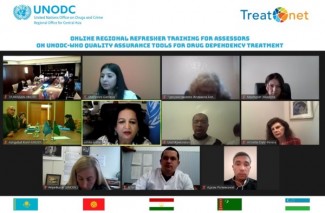UNODC Regional Office for Central Asia Organizes Online Regional Training for Assessors on UNODC-WHO Quality Assurance Mechanisms/Tools for Drug Use Disorder Treatment

Five-day online regional refresher training for assessors on UNODC-WHO quality assurance (QA) tools for drug dependency treatment launched on 12 October 2020. The purpose of the training is to consolidate the institutional support to ensure the successful implementation of the UNODC-WHO QA mechanism of drug treatment services in Central Asia and promote the scientific understanding of quality drug use disorder treatment and care services.
For the five days, the participants from Kazakhstan, Kyrgyzstan, Tajikistan, Turkmenistan and Uzbekistan will have a unique opportunity to discuss important issues related to the development and institutionalization of a drug treatment services QA mechanism to improve the quality of drug use disorder treatment in Central Asia.
Following the launch of UNODC-WHO International Standards of Treatment of drug use disorders and the approval of resolution 59/4 by the Commission on Narcotic Drugs (which calls for the development and dissemination of International Standards for Treatment of Drug Use Disorders and urges UNODC to support a systematic process of national adaptation and the adoption of national QA standards for the accreditation of services in accordance with national legislation), the need for new globally applicable tools based on an agreed dissemination strategy was proposed in order to ensure a qualified and effective response to drug use disorders around the world.
The development of such quality standards on drug use disorder treatment services is necessary in order to evaluate good practices informed by science and ethical principles. The quality standards also help to guarantee the same quality standards and opportunities for drug-dependent people that are provided by the health system for any other chronic disease.
The online regional refresher training for the national expert assessors and other experts involved in the development of national QA standards will focus on following actions related to continuing introducing QA standards in Central Asian countries:
- Reflections on the achievements in Central Asia based on the findings of pilot initiatives
- Updates on ‘International Standards’ WHO-UNODC 2020 and new UNODC-WHO Services QA Toolkit and the Consensus Standards.
- Run-through on QA Standards areas with a focus on what is currently missing in Central Asia.
- Focus on assessment methods and improvement planning.
- Identifying changes required in each country following the pilots and next steps in adopting the International QA Standards and developing National QA Standards.
Ms. Ashita Mittal, UNODC Regional Representative for Central Asia, highlighted “that these standards need to be globally applicable and aligned with the UNODC-WHO International Standards for Treatment of Drug Use Disorders and serve the purpose of supporting policymakers, treatment services managers and practitioners to improve their capacity to deliver quality drug use disorder treatment and care services”. She also used this opportunity to thank the national counterparts for their commitment to introduce UNODC QA standards and tools by supporting the establishment of Working Groups on adaptation and piloting of the 2019 version of the UNODC QA standards and tools for drug treatment services.
This training is organized within the framework of UNODC global project GLOJ71 “Treating drug dependence and its health consequences: Treatnet II”.
